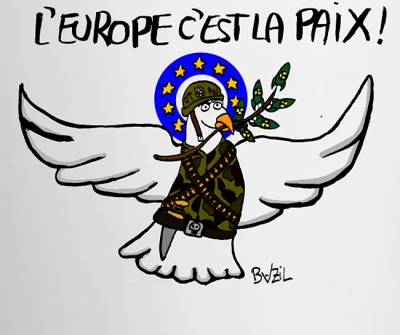If concerns about immigration and freedom of movement have fueled a populist wave across the continent, the European Union prides itself on numerous achievements, such as creating one of the largest single markets in the world and granting 500 million people the right to live and work in any of the 28 member states.
Since the signing of the Treaty of Rome on March 25, 1957, peace may represent the EU’s greatest achievement and its most precious legacy.
To better understand this assertion, one must account for the number of deaths that occurred during European wars between the years 1800 and 2016.
In the 19th century, Europe was ravaged, conflict after conflict. Between 1803 and 1815, nearly 6 million people perished in the Napoleonic Wars. The Hungarian revolution and the Franco-Prussian War resulted in the deaths of hundreds of thousands of people.
However, the first half of the 20th century was indisputably the bloodiest period in Europe’s history. According to the InPosterum project, more than 32 million people lost their lives during World War II.
The second half of the 20th century was also marked by numerous conflicts. The Greek civil war, which broke out in 1946, claimed the lives of 158,000 people.
The European Economic Community, created in 1957, strengthened economic and social cooperation among the member states. It resulted in significant economic growth but also reduced conflicts and the number of deaths on the continent.
According to data, between 1961 and 1992, Europe experienced 18,409 war-related deaths.
After the creation of the European Union in 1993, wars became rare once again. The breakup of Yugoslavia, the Northern Ireland conflict, the South Ossetia war, and the Donbass conflict resulted in many deaths.
Nevertheless, these wars do not reach the bloodshed level of the 1800s or the first half of the 20th century: 63,573,045 is the total number of violent deaths related to wars between 1801 and 2016.
The importance of the European Union is undeniable: it has played a major role in unification and maintaining peace on the continent.
“Never did a greater, more beautiful, or more useful project occupy the human mind than that of perpetual and universal peace between the peoples of Europe,” wrote Jean-Jacques Rousseau in “Project of Perpetual Peace” in 1761.


